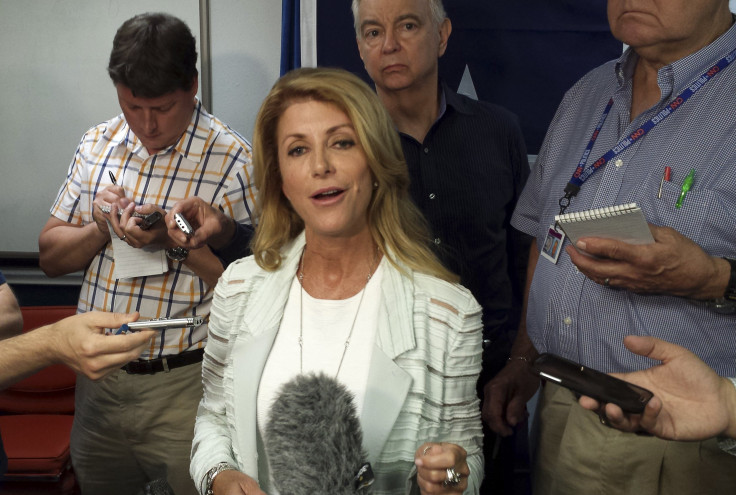Wendy Davis: After Texas Governor Race, What's Next?

Democratic Texas state Sen. Wendy Davis emerged from obscurity last year after staging an 11-hour filibuster to block an anti-abortion bill. The live-streamed, much-tweeted piece of political theater made her a national star with a strong base among women and in the Democratic Party. Davis hoped that celebrity would help propel her to the Texas governor's mansion. But in a state as deeply red as Texas, the odds were never in her favor, and Tuesday night she lost to Republican Greg Abbott.
The challenge now is for the 51-year-old Harvard Law graduate in pink Mizuno “Wave Rider” sneakers to show she has staying power and, unlike her footwear, isn't just a fleeting Internet sensation.
Although the bill she famously filibustered eventually passed, liberal women in Texas (and around the country) saw Davis as “a standard-bearer [in] a landscape of politics that has not had any real female heroes in 20 years,” said Amanda Stevenson, a researcher with the University of Texas at Austin’s Texas Policy Evaluation Project. Davis may be able to translate that into a national role.
It's not that Davis was too small for Texas -- maybe Texas is too small for her, said Neftali J. Garcia, adjunct professor in public administration at Texas State University. “Lots of very competent Democrats who realize the electoral possibilities in Texas are very limited for [them] … move to D.C.”
Given Davis’ work on abortion issues as well as education and equal pay for women, “I think she’d be an excellent candidate for a Cabinet position in Washington,” Garcia said. Secretary of Housing and Urban Development Julian Castro, a Texas Democrat who served three terms as mayor of San Antonio, already made the leap from local politics to the national stage.
Whether Davis stays in Texas or moves to Washington, “I have no doubt she’ll continue to advocate” for choice, said Heather Busby, executive director of NARAL Pro-Choice Texas.
In theory, Davis could stay in Texas and run again in 2018 for any number of state government positions. However, “you don’t tend to go back,” Daron Shaw, a professor in the government department at the University of Texas at Austin, said. Davis had to slog through two tough campaigns in 2008 and 2012, and the gubernatorial run was uphill all the way. Texas Democrats are “basically a minority party by 8 to 10 points,” Shaw said, and “there aren’t many prominent statewide Democrat possibilities” for higher office.
Her gubernatorial candidacy was a long shot from the start. By one reckoning, Democratic candidates in Texas typically start off with about a 15-point disadvantage in the polls. Republicans have won every statewide election since 1994. No Democratic candidate for Texas governor has taken more than 43 percent of the vote in a gubernatorial election since Ann Richards in 1994.
The Republican nominee, Texas Attorney General Abbott, raised about $45 million for his campaign, to Davis’ $30 million. Her fundraising was impressive for someone who had only recently come to wide attention, but by the final days, Davis was reportedly down to her last $1 million. Late in the race, Abbott had about $13 million left in the bank, according to estimates.
Davis has not hinted what she might consider next. There's always a book, speaking engagements, putting in more time at a law firm. "She can write her own ticket," Texas state Sen. Sylvia Garcia said.
Garcia said she thinks Davis will stay in the Lone Star state. “Wendy’s heart is in Texas,” she said. At the same time, in politics, “we never close the door.”
...And this is the last time we're expecting to see Wendy Davis until the polls close. pic.twitter.com/nhkIJBFUp3
— Emily Baucum (@EmilyBaucum) November 4, 2014© Copyright IBTimes 2024. All rights reserved.






















